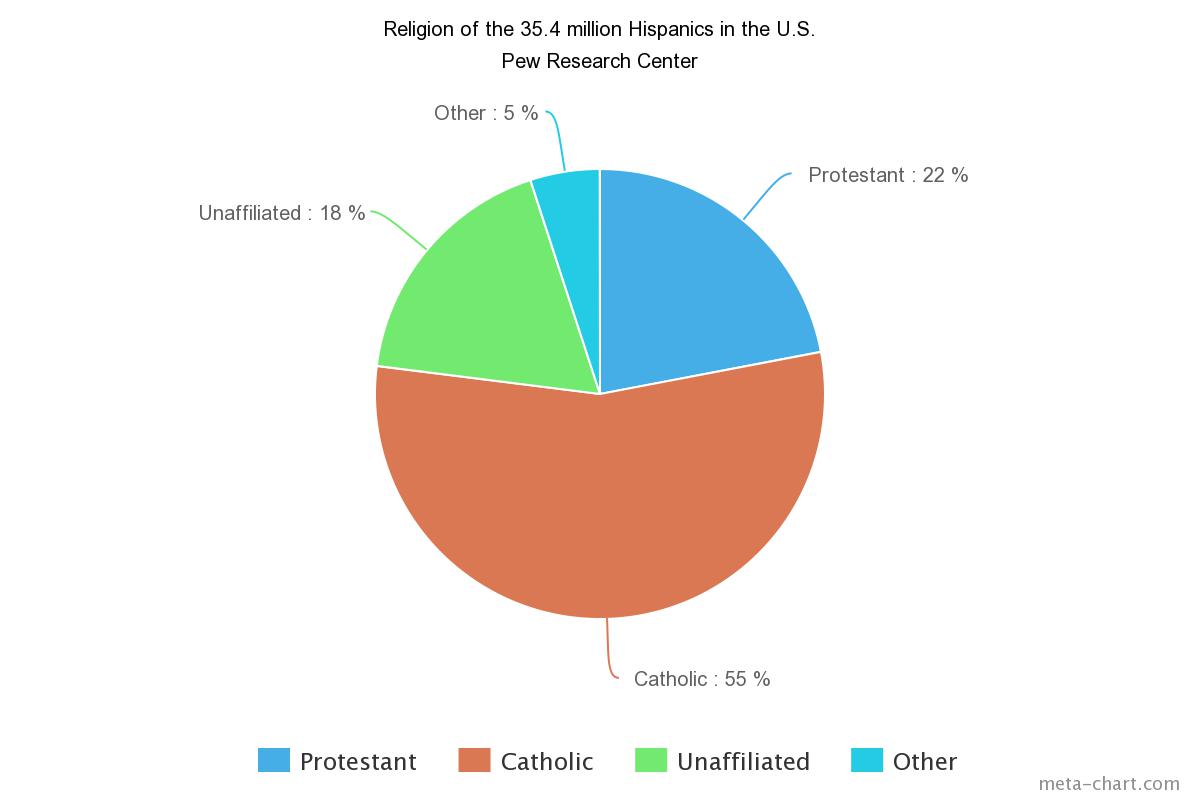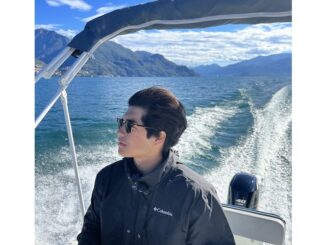
Immigrants, aliens, strangers, refugees and foreigners.
The Abrahamic holy books — the Christian Bible, the Hebrew Bible and the Quran — repeatedly identify these people as a historically oppressed and vulnerable group who believers should treat with compassion and respect.
Today, followers of Christianity, Judaism and Islam advocate for immigration reform and aid immigrants across the United States. In Ventura and Los Angeles counties, this takes many forms, including political advocacy, interfaith collaborations and providing practical assistance to the immigrant population.
“A distinctly Christian perspective needs to be informed by what the Bible has to say about the foreigner, the alien, the marginalized people in our societies,” Pepperdine University Professor of Religion Daniel Rodriguez said. “The Bible speaks a lot about the unholy trinity of the widows, orphans and foreigners. They’re mentioned together as kind of symbolic of marginalized people for many reasons — they were always vulnerable. God has a lot to say about the way his people, Israel, treats immigrants.”
The Abrahamic religions make up a significant portion of the United States population. Christianity is the largest religion in the U.S., making up about three quarters of the adult population, according to the Pew Research Religion and Public Life Project. Judaism is the second largest religion after Christianity (1.7 percent) — not including those who declare themselves religiously unaffiliated — and Islam is the fourth largest (0.6 percent).
Among Hispanics, who make up the largest immigrant population in Ventura and LA Counties, there is a Christian majority. About 55 percent of the nation’s estimated 35.4 million Hispanic adults identify as Roman Catholic, about 22 percent are Protestant, and about 18 percent are religiously unaffiliated, according to a 2012 article by Pew called “The Shifting Religious Identity of Latinos in the United States.” Approximately a quarter of Hispanics are leaving the Catholic faith for Protestantism or non-affiliation.

CHRISTIANITY
Many Christian leaders, organizations and churches urge immigration reform under the belief that current immigration laws have created moral, economic and political problems that have polarized the immigration issue into an imaginary choice between two extremes — amnesty or deportation. Coalitions such as the National Immigration Forum advocate for a comprehensive legislative upheaval of federal immigration law and policy.
Matthew Soerens, field director for the Evangelical Immigration Table, a coalition of the National Immigration Forum, said they operate under six principles “that we think are consistent with scripture and that we think would help the immigrants in our churches.” Soerens said they offer a bipartisan solution to immigration that:
- Respects the God-given dignity of every person
- Protects the unity of the immediate family
- Respects the rule of law
- Guarantees secure national borders
- Ensures fairness to taxpayers
- Establishes a path toward legal status and/or citizenship for those who qualify and who wish to become permanent residents
“A really broad range of Christian leaders have affirmed (these principles),” Soerens said. “Not everyone who has affirmed those principles would necessarily agree on one prescription, but we all think it’s very important for Congress to act.”
Soerens said the Evangelical Immigration Table does not advocate for amnesty, but that people be treated fairly and humanely.
“The Bible has a lot to say about how God’s people are supposed to treat immigrants, and that doesn’t allow us to ignore them when they are vulnerable,” Soerens said. “Evangelical churches are growing in immigrant communities. Much if not most of their growth are coming from immigrants. It means it is a very personal issue, not just an abstract number of statistics that there’s 11 and a half million undocumented immigrants or kids fleeing violence (in their home countries).”
Soerens said some of the most pressing problems immigrants face is cultural integration, learning English and understanding the immigration system.
“Most lawyers who are familiar with our immigration system say it’s roughly equivalent to the tax code in complexity, so one of the areas we’ve seen a lot of growth is churches providing legal services that are affordable but authorized,” Soerens said.
Besides offering legal aid, Soerens said churches can offer English as a Second Language (ESL) classes and academic support to youth, and minister to the elderly and refugees, who tend to be particularly isolated among the immigrant population.
“Advocacy is a really important way to serve immigrant communities,” Soerens said. “Churches can and do a really great job of welcoming immigrants and meeting very tangible needs … Discipleship won’t solve structural issues unless we’re willing to advocate for policy change.”
Soerens co-authored a book with Jenny Hwang called Welcoming the Stranger (2009), which discusses in more depth how Christians can balance obeying the law and aiding the oppressed and vulnerable.
Other books about Christianity’s role in immigration include James K. Hoffmeier’s “The Immigration Crisis: Immigrants, Aliens, and the Bible” (2009); Ben Daniel’s “Neighbor: Christian Encounters with “Illegal” Immigration” (2010); and M. Daniel Carroll’s “Christians at the Border: Immigration, the Church, & the Bible” (2013).
Rodriguez, the Pepperdine religion professor, said he was heavily influenced by Carroll, who reminds him, “when we’re talking about immigration, we’re actually talking about people. “It’s easier to talk about things that influence people if we depersonalize them.”
Rodriguez said it is important for Christians to talk about immigration as an issue and about immigrants as people, and to make sure they have a “distinctly Christian perspective” when they do. However, there also cannot be a one-for-one-correlation between how Ancient Israel — a theocracy — and the United States treat immigrants, Rodriguez said, but that “God expects his people to show a level of compassion and hospitality in this conversation toward the outsider … A Christian is someone who sees people as God sees them … We recognize the laws of the land, but as Christians, we recognize that with a Christian identity, this is not my homeland.”
Rodriguez said Christians can actually identify with immigrants because they are also strangers in a strange land.
“I owe my ultimate allegiance to a king who is not of this world, and my hope is in the final deliverance by that king when he comes to take his people home,” Rodriguez said. “This is not home. For many Christians, especially in the U.S., that’s a real challenge because too many Christians in the U.S. do not separate their identity as Christians with their identity as U.S. Americans. To me, that’s very problematic. They blend them like threads in a pair of pants. They can’t separate them, and that’s unfortunate.”
Rodriguez said those Christians who recognize that the Earth is not their home will be more sympathetic toward immigrants, documented and undocumented alike, who view the United States as the Israelites viewed Egypt — a temporary place in which to survive until they are able to return to their patria, their homeland.
Conservative religious communities are consistently more likely than non-religious people to have liberal beliefs about immigration reform, Benjamin R. Knoll, professor of political science at the University of Iowa, found in a 2009 study “And Who Is My Neighbor?: Religion and Immigration Policy Attitudes” in the Journal for the Scientific Study of Religion.
While Knoll’s interactions with immigrants were mostly in Virginia about a decade ago, he wrote in an email that his general experiences and observations match up with those of activists in California today, namely with the issue of poverty and discrimination.
“There were many, many times that I’d be sitting in a waiting room with my immigrant friend and overhear a very loud comment from an American in the room saying something like ‘I don’t get why they don’t just learn English if they’re here!’ or things like that,” Knoll wrote. “It was eye-opening to me to see stuff like this in person … This matters because research has shown that groups that are viewed favorably by the public (e.g. veterans, senior citizens, etc.) get ‘benefits’ from public policy while those who are viewed negatively (e.g. criminals, the poor, immigrants, etc.) get ‘burdens.’ Government policy tends to benefit those who are viewed favorably in society and vice versa.”
The public is much more likely to view immigration of non-white ethnicities as negative, including Hispanics, Asians and Middle Easterners, Knoll wrote. When it comes to making political and social choices concerning deportation, this racial distinction can have long-lasting consequences on individuals, families and communities.
In a movement called Sanctuary 2014, 24 churches from 12 cities around the country pledged to offer sanctuary to undocumented immigrants facing deportation. Ventura County’s sanctuary was at the United Church of Christ, a small 80-member church in Simi Valley, church member and minister emeritus Rev. Frank Johnson said.
“It was a very engaging kind of project because of the fact that this was a controversial action to take, and it was one in which we were acting in the name of justice, so we felt that we were called to do this,” Johnson said.
Johnson said the congregation decided together to bring in an undocumented woman from Oxnard. She was in danger of being deported and separated from her family: three children — including a nursing infant — and a husband, all U.S. citizens.
“Since we made a public statement that our church would be a sanctuary church, although the government could have come and taken her away, they did not,” Johnson said. “They respected the sanctuary and in the meantime, her attorney was working to bring her case to court.”
The courts have not yet resolved the woman’s case, but she received deferred action, which is protection against deportation for a year. Each year after that, it is renewed until her case is resolved in court, Johnson said.
Churches
While immigration is an important issue among Christians — according to Rodriguez, Soerens and other leaders — individual churches in Southern California participate to varying degrees. Some church leaders said they make it a point to make sure everyone, including Spanish speakers, feel welcome, while other churches offer specific ministries to immigrants, Spanish services and other resources to help them integrate into their communities.
Rodriguez said few churches in Southern California are anti-immigrant, but that if they are, it’s probably because they have no immigrants in their congregation.
“If you’re marrying and burying them, you become more accustomed to seeing them as human beings,” Rodriguez said. “Overall, at least the churches I’m familiar with, have a pretty positive stance. Some are much more outspoken about it with advocacy, signing documents. (And) everybody I know wants comprehensive immigration reform.”
Following are just a few examples of the hundreds of churches in Ventura and LA Counties.
Churches that do and do not offer services, resources and/or ministries directed at the immigrant community
The information about the churches above is based on the churches’ websites and interviews with church representatives. The featured churches were selected based on the first 20 pages of results of a Yelp search of churches in Ventura County and references from different religious leaders. This is neither exhaustive nor does it suggest that the immigrant community is excluded from the churches that do not offer ministries or resources directed at immigrants.
St. Rose of Lima Parish
St. Rose of Lima Parish offers classes in collaboration with the Mexican Consulate to teach people how to read and write in English, Hispanic Director Livia Perez said.
Perez said the parish has to be careful, however, as immigration is a “delicate issue,” and if the parish gives out incorrect advice or information, “They’ll blame the church,” Perez said.
While they have a policy against referring people to lawyers or giving advice to prevent legal problems with the church, Perez said the parish has “wonderful programs” that help pay for food and rent for low-income families, many of whom are immigrants, and provide letters of recommendation for jobs.
“We are here to help everybody,” Perez said. “We are here to help the needy. It does not matter what race or what denomination.”
Praise Chapel Christian Fellowship
Pastor Donna Neville of Praise Chapel Christian Fellowship said Huntington Park, where her church is located, has some of the highest numbers of undocumented immigrants per capita.
“A lot of the community has a lot of need, so our main focus is winning people to the Lord and hopefully getting them into church,” Neville said. “We don’t ask questions when we meet people that have to do with their status … Some people will let us know their status and some don’t. Our main concern is ministering to their spiritual needs.”
Neville said the church offers ESL classes, which has had a small response, “but the people who did respond were just thrilled that they had an opportunity to learn English without a fee.”
The “When Labels Don’t Fit” article found that 87 percent of Hispanics believe learning English is necessary to succeed in the U.S. However, because of high poverty rates among the Hispanic immigrant community, many of them have neither the time nor money to afford classes.
Praise Chapel also hosts giveaways: toys at Christmas, school supplies in August and gently used clothes year round.
“We just see people as people,” Neville said. “It’s not even in our interest. If someone has a need, our first interest is to bring the Gospel to them. We don’t see them based on immigrant status. We don’t make an issue out of it.”
Neville said when people do come to her seeking advice, she always encourages them to follow the legal route and make things right, but that she “doesn’t police it” so that no one feels alienated.
Santa Paula Church of Christ
Minister Bob Perez of the Santa Paula Church of Christ said his church doubled in size — from 60 to 120 people — within a year when he started offering services in Spanish at his predominantly Anglo church.
“They came flocking,” he said. “For me, my philosophy is that I feel like if I’m going to teach them and go into their world, I’m going to have to learn Spanish … It’s their comfort language. I preach in Spanish when they ask me to. People say, ‘They’re in America so they have to learn English,’ but we have to approach it as missionaries. I’m trying to win them over to Christ, too.”
Perez said having a congregation of immigrants — documented and undocumented — can be challenging. He said that they are “receptive, humble, good people,” but that it also makes the church “very transient.”
In one case, he said, a male member of the church was deported and is now in his home country, while his wife and children — all American citizens — are still in the U.S.
“As a church, our policy has been that if we know about their situation, we’re going to try to help them to get legalized here,” Perez said. “That’s our policy.”
Perez said this is especially important if an undocumented member wishes to be ordained or become an elder or deacon in the church. While the church wants to do things legally, many people don’t come forward because they are afraid.
“Trust is a key thing,” he said. “I’ve been ministering to that population for almost 10 years. I’m surprised they still don’t want to trust and be Americanized and to learn English. Even though I speak Spanish and work with these guys, I’m surprised how much they want to stay in their culture. The big emotional gap is getting them to trust members.”
This experience is in line with Rodriguez’ perception as well as the 2012 Pew Research Center article, “When Labels Don’t Fit: Hispanics and Their Views of Identity,” which states 47 percent of Hispanics, including both immigrant and U.S.-born Hispanics, consider themselves “very different” from Americans and do not identify with American culture. The article also says 86 percent of Hispanics — compared to 61 percent of the general American public — have higher levels of distrust when dealing with people.
JUDAISM AND ISLAM
A majority of Hispanic immigrants are Christian, but Jewish and Muslim leaders in Ventura and LA Counties said Judaism and Islam are deeply invested in the issue of immigration also — regardless of race or religion.
Judaism
Rabbi Mark Diamond at the Academy for Jewish Religion connected the Jewish festival of Passover, or Pesah, which celebrates freedom, deliverance and redemption, to the immigrant experience of yearning for rebirth and relief as well. From the Exodus in the Torah to strife in Israel today, the issue of immigration is deeply ingrained in the Jewish tradition, Diamond said.
“I think that translates to a strong deeply held Jewish notion that we were strangers in a strange land,” Diamond said. “There’s a long standing Jewish view in the Torah/Old Testament of not oppressing the stranger, widow and orphan. It is too easy to oppress people like that, and we must not. That’s been part of our tradition now for thousands of years. We ourselves have wandered from land to land.”
Diamond said Jews in general believe in immigration reform “because it is in our Jewish DNA.” However, he emphasized that people cannot just talk about it.
“Our faith traditions also require us to labor for social justice — to raise our voices as well as our hands,” he said, citing Leviticus 19:33-34 from the Torah: “The strangers who sojourn with you shall be to you as the natives among you, and you shall love them as yourself; for you were strangers in the land of Egypt.”
The Hebrew Immigrant Aid Society, for example, is an international refugee resettlement organization that also advocates for immigration reform in the United States. The motto, “Welcome the stranger. Protect the refugee,” is based on the mandate in the Hebrew Bible to welcome the stranger in a strange land, Diamond said. HIAS is funded by Jewish federations around the world.
More locally to Southern California, the Jewish Family Services of Los Angeles also works to resettle refugees. While most of its recipients are Jewish, it offers its services to all, Diamond said. One of its programs is SOVA — meaning “eat and be satisfied” in Hebrew — which offers food and other resources to community members.
There are also professional and volunteer lawyers doing pro bono work for immigrants, Diamond said, such as Bet Tzedek, a Jewish legal aid society for low-income families and undocumented immigrants of all nationalities and religions.
The Jewish Labor Committee, a national organization with an office in LA, works directly with farmworkers, and synagogues work together and with other religious institutions to provide relief for immigrants, Diamond said.
For example, the Malibu Jewish Center and Synagogue is deeply involved in the Malibu Community Labor Exchange, though Hispanic immigrants are generally not Jewish, Rabbi Judith HaLevy said. The labor exchange is a nonprofit that helps the unemployed find jobs and employers find laborers.
“We are a very serious supporter of the labor exchange,” HaLevy said. “It’s our outreach to the Hispanic population … You are commanded 31 times in the Torah to take care of the orphan, widow and stranger that lives with you.”
Halevy said there are three synagogue members active on the labor exchange board, the synagogue brings all of its leftovers to the labor exchange, and the synagogue usually hires its temporary workers through the labor exchange.
In collaboration with the Malibu United Methodist Church, the synagogue also hosts an annual Thanksgiving dinner for people who are immigrants and homeless.
“It’s grown into a huge program,” HaLevy said. “We fed almost 600 last Thanksgiving.”
While he acknowledged every synagogue and individual can make a difference, Diamond said it is not enough.
“This problem is too big to be left to well-intentioned individuals and congregations,” he said. “We need government action.”
Diamond said it is incoherent and counterproductive for the lives of immigrants to be left up to individual states instead of reforming immigration policy through unifying federal legislation.
“Our mission is to end the misery and suffering of 11 million men, women and children who live in the shadows of this great nation,” Diamond said. “Our goal is to pass comprehensive immigration legislation that ensures family reunification, a full path to earned citizenship, employment visa reform, and effective, humane border control that safeguards our national security.”
Islam
The issue of immigration is also deeply rooted in the Muslim faith, said Muslim Public Affairs Council Director of Policy and Programming Edina Lekovic. Lekovic cited the story of the first migration of Muslims:
“The first group of Muslims with the Prophet Muhammad were persecuted for about a decade until they decided that they too needed to migrate, so they did and formed a new community, which marks the start of the Islamic calendar,” Lekovic said. “It’s really powerful to think about how this migration story is so central to Islamic teachings, and it says a lot about how we are taught to treat those who are immigrants, those who are refugees, even what the definition of ‘community’ is.”
Like the Bible and Torah, the Quran has several parables and teachings about the way Muslims should treat immigrants, and the issue of immigration hits home for many American Muslims, Lekovic said. With approximately three million Muslims in the United States — according to Pew’s 2012 article, “Religious Composition by Country, 2010-2050” — about two-thirds of them come from immigrant families, Lekovic said.
Like Hispanic immigrants, “Most (Muslim immigrants) came here for educational or economic aspirations,” Lekovic said. “The challenge today for Muslims, like for many other non-Latino communities, is that immigration is understood as a Latino issue.”
Lekovic said she also comes from an immigrant family from the former Yugoslavia. Her parents fled in search of religious freedom and educational opportunity.
However, while immigration is a personal and religious priority for many Muslims, Lekovic said most mosques are small, volunteer-run and don’t have many funds. California has the largest Muslim community in the U.S., and they number at just 1 percent of the state’s population. This means individual mosques are unable to provide much physical aid to immigrants, regardless of whether they’re Muslim, Hispanic or other, Lekovic said.
Islamic Center of Ventura County Director Taha Khan said the center only has about 200 people maximum, so unlike some bigger Islamic centers, they are unable to have specific programs directed at helping immigrants. But he emphasized that Muslims welcome and aid everyone however they can.
“Islam has principles and laws (to help the vulnerable), regardless of what religion they are,” he said.
Many mosques also also becoming more prepared to refer congregants to lawyers, agencies and other assistance that may help them in the documentation and integration process, Lekovic said.
However, limited funds and smaller numbers don’t prevent Muslims from advocating for immigration reform, Lekovic said.
The Muslim Public Affairs Council, for example, advocates for immigration reform under many of the same principles as organizations like the Evangelical Immigration Table and the Hebrew Immigrant Aid Society, Lekovic said: compassion, humanity, keeping families together, religious morals, collaborating with other faiths and organizations, justice, equality, border security and fairness.
“The system is broken, and it needs to be fixed,” Lekovic said.



